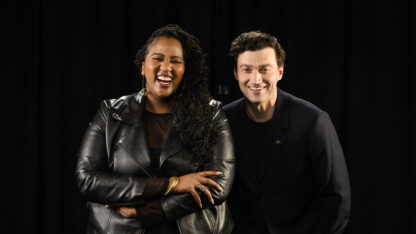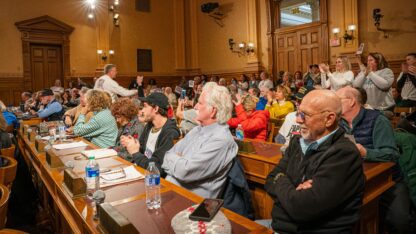“You can’t come to a play called ‘Booty Candy’ and expect that it’s going to be ‘Gilligan’s Island.'” That’s what the award-winning playwright Robert O’Hara said about his show that premiered in 2011. With outrageous humor, the play explores themes of growing up Black and queer in America. A new production of “Booty Candy” is being performed through June 12 at Actor’s Express, and director Martin Damien Wilkins and actor Parris Sarter joined “City Lights” host Lois Reitzes via Zoom to talk about the play.
Interview highlights:
A story as offbeat as its title:
“I don’t know exactly why Robert chose this to be the name of the show, but I have had the wonderful opportunity to meet him on a few occasions. I am not surprised that the name of the show is ‘Booty Candy,’ if that makes sense,” said Wilkins. “He doesn’t shy away from making very bold statements … He doesn’t shy away from going into territories that will make some people uncomfortable, but at the same time, leave you with side-splitting laughter, too, if you just go along on the ride with him.”
“The play really follows closely a character named Sutter, who himself is not only Black and queer, but also a playwright,” Wilkins explained. “This isn’t so much a coming-out story as it is a kind of coming-of-age story for this young Black queer man, who’s navigating not only his relationship to his family as he’s coming out, but also to his profession as a writer.” He added, “In the midst of that story, you also get some very thought-provoking and very funny vignettes. And so you may find yourself inside of a play inside of a play, and you have to come see the show to understand what I mean by that.”
Exploring a parent’s reaction to flamboyant queerness:
“As any Black mother of that particular time, especially, I think she’s aware of it, but at the same time, hoping that he’s going to be straight. There is a line that she says, ‘How on earth do you expect to get a woman when you grow up?’ It’s like, she knows he’s gay. But there’s a sense of, I hate to say this, but ‘he might grow out of it.’ It’s just one of those, ‘I see it, but I don’t want to see it,’ kinds of things that’s happening,” said Sarter.
Sarter continued, “At the same time, she loves her son dearly and she wants to protect her son dearly, and I think that’s why she believes that if he’d just be straight, or don’t do this, or don’t do that. And I know; I grew up with a lot of my friends who are queer Black men, who have had their mothers and aunts and grandmothers tell them not to flick their wrists or talk a certain way … It’s just a sense of, you need to be, quote unquote, ‘normal,’ but it’s also her coming to terms, and also her journey of accepting her son for what he is and who he is, and that that’s alright.”
Dismantling assumptions with satire:
“In that great tradition of satire, he really puts a lot of it in front of us in a way that we have to confront it, whether it be an outrageous stereotype or whether it be a way in which he plays on expectations of what audiences think they’re going to see. I think it gives great permission for us to push the story as far as we want it to. It’s very clear to me he was a student of George C. Wolfe. I think for a lot of people that see this play, they definitely see the DNA of ‘The Color Museum’ in this play,” Wilkins reflected.
“This is my second production of ‘Booty Candy,'” said Wilkins, “And I think one of the things that really struck me this time around is, really, how we look at identity and how we present ourselves as our most authentic to the world … There’s a few moments in the play where the fourth wall is really broken down between the actors and the audience. And to me, those moments really feel like Robert interrogating what is often asked of Black artists in terms of what they are permitted; the stories that they are permitted to tell.”
“Booty Candy” is on stage at Actor’s Express through June 12. Tickets and more information are available at actors-express.com/play-page-bootycandy.










